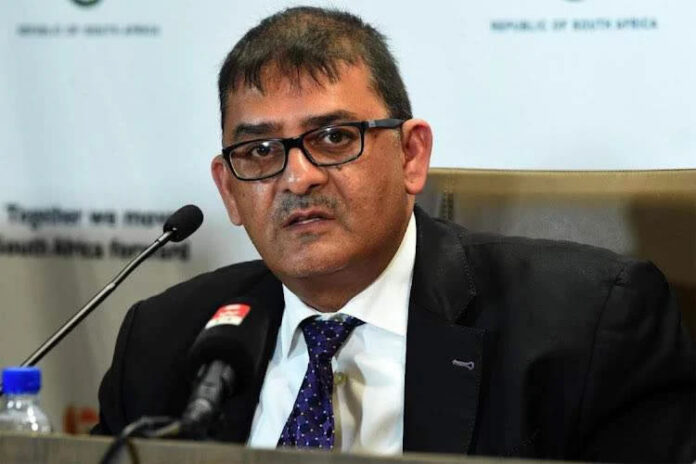President Cyril Ramaphosa has suspended the Inspector-General of Intelligence, Imtiaz Fazel, following a complaint about his conduct. The suspension comes as Parliament’s Joint Standing Committee on Intelligence (JSCI) prepares to investigate the allegations.
In a statement late on Wednesday, Presidency spokesperson Vincent Magwenya confirmed that Fazel would remain suspended pending the committee’s inquiry. “The JSCI has informed President Ramaphosa that it has received a complaint on the conduct of the Inspector-General and that the committee will conduct an investigation in line with Sections 7(4) and 7(5) of the Intelligence Services Act (Act 40 of 1994),” Magwenya said.
Section 7(5) of the act allows the president to suspend the Inspector-General while an investigation by the JSCI is ongoing. This ensures that any potential interference with the investigation is avoided while the allegations are thoroughly examined.
Fazel’s suspension comes amid heightened scrutiny of South Africa’s criminal justice and intelligence systems, following explosive claims of political interference and corruption within the South African Police Service (SAPS). The allegations, first raised by KwaZulu-Natal police commissioner Lieutenant General Nhlanhla Mkhwanazi, prompted the president to establish the Madlanga Commission to probe the supposed capture of the justice system.
The ad hoc committee in Parliament is currently hearing testimony related to these allegations. Its proceedings run parallel to the Madlanga Commission, which has already received extensive evidence suggesting the existence of a network of corruption that spans senior police officials, business figures, and politicians.
Among those named are controversial tender tycoon Vusimusi “Cat” Matlala and North West businessman Brown Mogotsi. Both have been accused of leveraging political and police connections to influence procurement processes and investigations. Testimony presented through a protected witness, referred to as “Witness X,” included WhatsApp messages, payment records, and phone logs, which allegedly demonstrate direct communication between syndicate members and high-ranking law enforcement officers.
“These exchanges allegedly show attempts to manipulate police operations, obstruct investigations, and undermine accountability,” a source familiar with the proceedings said.
The inquiry has also heard that suspended deputy national police commissioner Lieutenant General Shadrack Sibiya may have played a role in decisions linked to the disbandment of the Political Killings Task Team (PKTT). This specialised unit was investigating more than 120 politically motivated murders in KwaZulu-Natal. Mkhwanazi told the ad hoc committee that the task team’s dissolution, which occurred while key officials were on leave, effectively derailed ongoing investigations and shielded politically connected individuals from scrutiny.
The allegations against Fazel emerge at a time when Parliament is actively grappling with the challenge of restoring integrity to the country’s security and intelligence structures. Despite Fazel’s suspension, Minister in the Presidency Khumbudzo Ntshavheni emphasised that the country’s intelligence operations remain fully functional. “The intelligence structures are fully operational, whether it’s crime intelligence, whether it’s state security, whether it’s defence intelligence,” she said.
Analysts have noted that the series of suspensions across the security cluster indicates a political will to address potential corruption at the highest levels. Independent crime and policing analyst Johan Burger said: “The fact that some of the high-profile members of these organisations are now being acted against is something that one would expect to happen if we are serious about rooting out corruption and criminal involvement by senior state officials.”
Similarly, Lawson Naidoo, executive secretary of the Council for the Advancement of the South African Constitution, stressed the importance of proper investigations. “I think the important point is that where there are allegations, they need to be properly investigated. They need to be investigated speedily, and they need to be resolved speedily, so that we can move on. People need to be removed, and they must be removed, but there must be a good cause for their removal,” he said.
However, legal experts have warned that repeated suspensions of senior figures could threaten stability if not handled carefully. Unisa law expert Professor Dumisani Mabunda said: “While these suspensions are serious, there’s no need to panic because we are not in a state of emergency. The country’s security structures remain intact.”
The investigations into Fazel’s conduct, alongside ongoing hearings at the ad hoc committee and the Madlanga Commission, underscore the intensifying scrutiny over alleged corruption, political influence, and criminal infiltration at the highest levels of South Africa’s security apparatus.
As Parliament and the commissions continue their inquiries, the outcomes could have far-reaching implications for the management of intelligence, law enforcement, and the protection of public trust in government institutions.

Follow Us on Twitter











